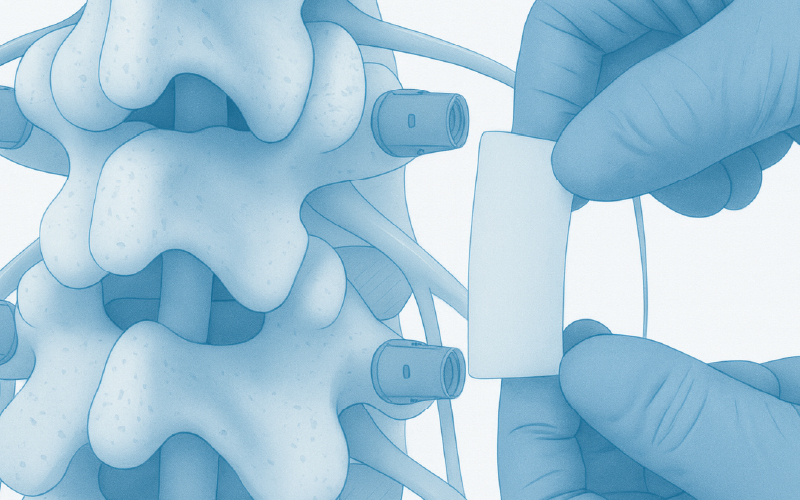Call SICE-MPr/2023/02 - Productive Innovation - Low Density
Individual productive investment operations in innovative activities, promoted by SMEs, in low-density territories.
Bioceramed is committed to biotechnological innovation to transform the treatment of spinal disorders and improve patients' quality of life.

Bioceramed, a Portuguese company specialising in the development and manufacture of high-tech medical devices, is investing in biotechnology to transform the future of spinal surgery. The BiOsseoSpine2.0 project, co-financed by COMPETE 2030, aims to develop a multifunctional organic-inorganic hybrid membrane for posterolateral spinal fusion, with advanced bone regeneration properties and the potential to significantly improve patient recovery.
According to Alexandre Barros, CEO of Bioceramed, “the BiOsseoSpine2.0 project stems from the ambition to respond to one of the greatest challenges in spinal surgery: effective bone regeneration in posterolateral spinal fusion procedures. This procedure is performed annually on more than 3 million patients worldwide, representing a growing market, but one still marked by high rates of complications, such as pseudoarthrosis and post-surgical infections, which can affect up to 15% of cases.”
Innovation to meet the challenges of spinal surgery
Low back pain and degenerative spinal disorders are one of the leading causes of disability worldwide. When conventional treatments fail, spinal fusion surgery becomes the only effective solution — but it still faces significant limitations due to existing materials, which do not always ensure complete bone regeneration.
BiOsseoSpine2.0 has been developed precisely to respond to this challenge, through the research and development of advanced biomaterials with superior biological properties. “With BiOsseoSpine2.0, we are developing a bioactive organic-inorganic hybrid membrane capable of simultaneously promoting osteoconduction, osteoinduction, angiogenesis and antimicrobial activity, combining safety, efficacy and superior clinical performance,” explains Alexandre Barros.
From research to clinical application
With a duration of 24 months, the project includes several phases of research, development and pre-clinical validation, ensuring the scientific and technological rigour necessary for future CE and FDA certification.
The resulting membrane will be validated in vitro and in vivo, assessing biocompatibility, toxicity and efficacy in bone regeneration. The aim is to reduce recovery time, decrease the number of revision surgeries and improve the integration of the implant with the host bone, contributing to a faster and more predictable recovery for patients.
The contribution of COMPETE 2030
The support of COMPETE 2030 has been essential in ensuring the scientific and technological soundness of the project. “The support of the COMPETE 2030 programme has been decisive for the success of this journey, allowing us to consolidate the applied research component, ensure the scientific and technological rigour necessary for pre-clinical validation, and prepare the transition to pilot production and the regulatory phase,” highlights Alexandre Barros.
This support reinforces Bioceramed’s role as an international benchmark in the field of medical biotechnology, contributing to the development of innovative healthcare solutions and strengthening the national R&D ecosystem.
Portugal at the forefront of regenerative medicine
With a presence in more than 50 countries, Bioceramed has established itself as a leader in the development of highly complex medical devices in the fields of orthopaedics, spine and dentistry.
“This project reinforces Bioceramed’s innovative portfolio, expanding its range of state-of-the-art regenerative and orthobiological solutions. BiOsseoSpine2.0 is yet another example of our commitment to positioning Portugal at the forefront of regenerative medicine, developing high added-value medical devices with a global impact on the health and quality of life of patients,” concludes Alexandre Barros.
27 February 2026
Individual productive investment operations in innovative activities, promoted by SMEs, in low-density territories.